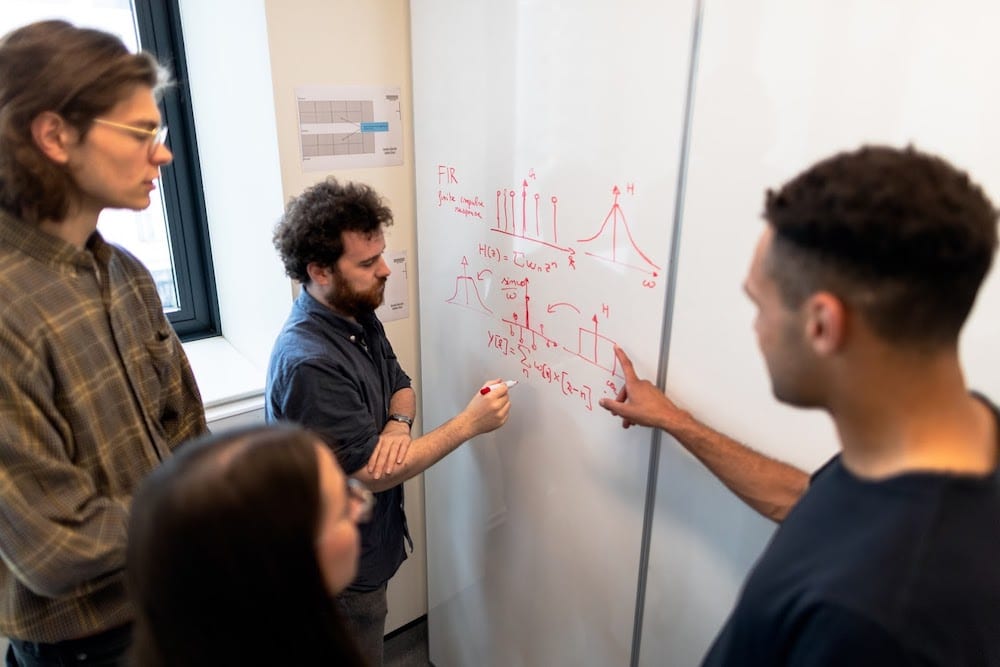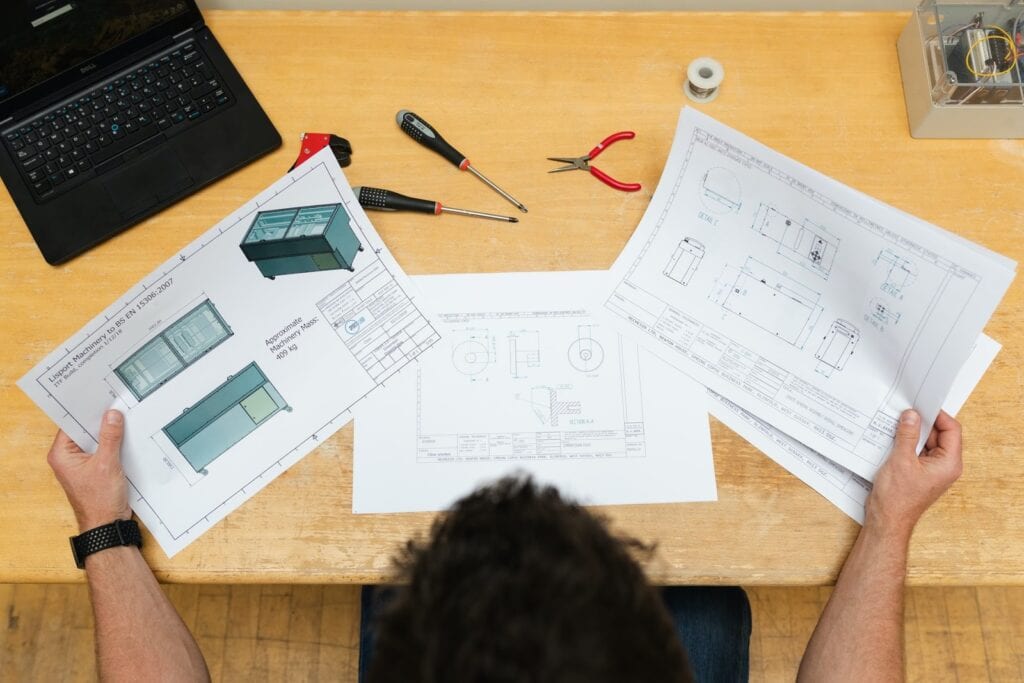Build a Foundation for Future Career Opportunities
Mechanical engineers move heaven and earth to bring the modern world closer to all of us. From Archimedes in classical antiquity to James Watt at the dawn of the industrial revolution, engineers and their mechanical designs have always stood at the forefront of progress, turning science into technology and guiding us into the future.1,2
Mechanical engineering plays a critical role in designing, developing, and maintaining essential systems, machines, and technologies that support modern society across various industries.
Just like their forebears, the mechanical engineering students of today are rising to meet the challenges of tomorrow. Machines currently in development will make transformational impacts on the future of transportation, medicine, robotics, and climate change.
Mechanical engineering courses present a unique opportunity to change the world. While learning how to join this storied profession is no easy matter, its long tradition comes with a trove of learning tools for training the next generation.
At the end of this read, you’ll hopefully decide whether or not you have the engineering skills, time, energy, and resources to pursue mechanical engineering courses and become a professional mechanical engineer.
What Is Mechanical Engineering?
In plain terms, mechanical engineering is the theoretical and practical study of how and why machines work. Mechanical engineers design, develop, build, and test mechanical systems and thermal systems. They apply the science of matter, energy, motion, and change to create ever more powerful and efficient machines that improve our quality of life.
Types of Mechanical Engineering
No definition of mechanical engineering can encompass its richness and complexity. The field is so vast that every mechanical engineer must cultivate a specific area of expertise. Boiled down, knowledge of mechanical engineering comes in four basic types.
Materials and Structures
You cannot engineer something without materials, and you cannot engineer something well without understanding how different materials respond to stress, pressure, and force. Once you have a handle on the properties of various materials, you can figure out how to combine them into optimal structures, from the very small (nanoscale) to the very large (macroscale).
Design and Product Realization
Born out of collaborations between engineering departments and private companies, product realization is the practical counterpart to the study of material science and structures. Mechanical engineers use computer-aided design techniques to synthesize knowledge and streamline the work of manufacturers as they develop more cost-effective and energy-efficient products.
Thermal, Fluid, and Energy Systems
Mechanical engineering was not a mature field of study until it could fully integrate the science of energy conversion. Thermodynamics, heat transfer, and fluid mechanics now aid mechanical engineers in their efforts to build better engines, improve power generation, and assist the transition to a greener economy.
System Dynamics and Controls
To better understand and more safely regulate dynamic systems, mechanical engineers make simulations that can grasp the relationship between parts and the whole and develop controls that can manage anticipated changes.
What Is Mechanical Engineering Used For?
The staggering number of things that mechanical engineers do means their skills are always in demand across a wide range of industries, including aerospace, automotive, construction, energy, and manufacturing. Below are the most common ways they apply their knowledge.
- Automotives. Mechanical engineers are responsible for the internal combustion engine, and they work to make vehicles of all kinds more efficient.
- Manufacturing. The science of materials and structures helps mechanical engineers improve the processes and designs behind the manufacture of consumer products.
- Energy and the Environment. Environmentalists increasingly rely on mechanical engineers for new technologies to reduce fossil fuel emissions in manufacturing, capture carbon dioxide, improve energy storage, and control pollution.
- Robotics. Electrical engineering and computer science majors could not build robots without mechanical engineers to help with things like sensors, materials, and design.
- HVAC and Refrigeration. Mechanical engineers apply their knowledge of thermodynamics, heat transfer, and fluid mechanics to keep us cool in the summer, keep us warm in the winter, and keep our iceboxes cool year-round.
- Biomedicine. Biomedical engineering is an emerging subfield to which mechanical engineers contribute the design and manufacture of biomedical devices.
Learning Mechanical Engineering

Degree programs are a common route to becoming a mechanical engineer, but you can also earn an engineering license without a formal degree. The Fundamentals of Engineering (FE) and the Professional Engineering (PE) exams are both grueling, so you’ll have a big commitment on your hands either way.3 In this section, we’ll break down exactly what it takes to learn mechanical engineering.
How Long Does It Take to Become a Mechanical Engineer?
The international community of mechanical engineers has worked hard to create a roadmap for disciples to follow. As a result, standardized mechanical courses of study in mechanical engineering degree programs give us a good estimate of how long it takes to join their ranks.
Expect to spend five solid years if you’re starting from scratch. With a strong foundation in science and mathematics, however, you may be able to complete your training and earn your engineering license in four years.
How to Learn Mechanical Engineering: Step-by-Step
Whether you enroll in a formal program or follow an independent curriculum, the path to becoming a mechanical engineer usually goes as follows:
- Establish a solid STEM foundation. To succeed in any engineering course, you must be able to solve engineering problems. And to solve engineering problems, you’ll need science and mathematics competencies. In the case of mechanical engineering, that means physics, chemistry, and advanced calculus, including differential equations and linear algebra.
- Study core topics in mechanical engineering. These are the practical applications of your solid foundation in science and mathematics. The basic mechanical engineering courses are statics, dynamics, thermodynamics, heat transfer, systems design, and computational engineering.
- Choose a specialization and career path. Around the third year in a mechanical engineering program, students branch out and study concentrations to train for a particular specialization.
- Pass the PE Exam to earn your license. As of October 2025, the Principles and Practice of Engineering exam for mechanical engineers consists of 80 questions, lasts nine hours, and costs $400 to take.4 The version of the test you take is determined by your career path. Options include HVAC and refrigeration, machine design and materials, and thermal and fluid systems.
Mechanical Engineering Courses and Training

Any student committed to becoming a mechanical engineering professional must travel a long road to get there. As the oldest and broadest of all engineering disciplines, the mechanical field of engineering science contains more knowledge than can be imparted in a short course of study, no matter how well-designed the curriculum or how talented the instructor.
All of which is to say, you should not expect to find any shortcuts in your search for courses and training. If you stumble upon a course that seems too good to be true, chances are it probably is.
Given how much society depends on mechanical engineers for safe, efficient, and constantly improving technologies, we need gatekeepers to guard the knowledge, set the standards for curricula and licensing, keep the state of scientific understanding up to date, and establish professional engineering organizations for those who earn degrees in mechanical engineering.
Bear that in mind as you browse mechanical engineering courses. Every step you take to increase your knowledge is worthwhile, but a formal engineering degree can certify your expertise and lend you credibility on the job market.
In-Person Mechanical Engineering Courses
Let’s start by looking at universities and colleges. The most obvious downside to pursuing in-person education is the potential for higher costs, but that can usually be offset by financial aid. If you decide to apply for a bachelor’s degree program, don’t forget to fill out your FAFSA.5
There are many excellent engineering diploma programs just in the United States. Any of the mechanical engineering programs accredited by ABET, which sets academic standards in a variety of STEM fields, is probably worth applying to.6
Yearly rankings released by the likes of U.S. News & World Report are great places to find reviews of the most well-respected programs.7 Rather than duplicate their work, this guide provides examples of three different tracks to degree completion that may be more helpful. These are the Gold Standard Track, the Budget Track, and the Exploratory Track. Any of these tracks could lead to the knowledge and certification you need to jumpstart your mechanical engineering career.
The Gold Standard Track: Stanford University
- Location: Palo Alto, CA
- Program: Bachelor of Science in Mechanical Engineering8
- Time: 4-5 years (180 credit hours)9
The Stanford School of Engineering is ranked among the best in the world in 2025, according to U.S. News & World Report, the Times Higher Education, and EduRank.10,11,12
Mechanical engineering students at Stanford take core courses in materials and structures, dynamics, thermodynamics, heat transfer, systems design, and computational engineering. But the breadth of course offerings also extends to electives, which students choose based on their vocational goals.
The Budget Track: Cleveland State University
- Location: Cleveland, Ohio
- Program: Bachelor of Mechanical Engineering13
- Time: 4 years (128 or 129 credit hours)14
The Washkewicz College of Engineering at Cleveland State University may not have the prestige of Stanford, but the mechanical engineering core curriculum is just as robust. Electives include HVAC systems, applied combustion, and four different laboratories to prepare students for jobs in private industry and government.
Mechanical engineers have access to an honors program, an accelerated master’s option for bachelor’s students, and a senior capstone. Through the Center for Engineering Experiential Learning (CEEL), students can also take advantage of internships with industry partners, getting a head start on work experience before they graduate.15
The Exploratory Track: LaGuardia Community College
- Location: Long Island City, NY
- Program: Associate of Science in Mechanical Engineering16
- Time: 2 years (68 credit hours), with the option to transfer to a 4-year school17
Community colleges offer many of the same courses as traditional four-year engineering degrees. After two years, you can carry those credits to an ABET-accredited school, where you can spend fewer years paying premium tuition.

"Career Karma entered my life when I needed it most and quickly helped me match with a bootcamp. Two months after graduating, I found my dream job that aligned with my values and goals in life!"
Venus, Software Engineer at Rockbot
If you decide to pursue this strategy, you can get your calculus, physics, chemistry, and core engineering classes out of the way while enjoying the bread-and-butter career and professional development services that make community education so valuable.18
Online Mechanical Engineering Courses
For all of the reasons stated above, high-quality online engineering diploma programs in mechanical engineering can be difficult to find. As a fundamentally practical discipline, mechanical engineering demands hands-on laboratory training that online courses can always imitate or supply.
That being said, online degree programs for mechanical engineering do exist. But the universe of distance learning options is larger and more diverse for those who already have a degree in hand. Once you have the core courses and fundamental concepts under your belt, you should consider online supplemental education in one of the specialized subfields.
Udemy
- Class Name: Thermodynamics for Mechanical Engineering19
- Length: 4 hours, self-paced
- Prerequisites: N/A
- Cost: $14.99
You can’t do much with a mechanical engineering degree unless you know how heat affects different materials and structures, and how temperature changes affect mechanical systems. If you need to brush up on your thermodynamics, then this is the course for you.
State University of New York (Coursera)
- Class Name: Digital Manufacturing & Design Technology Specialization20
- Time: 4 months at 10 hours/week, self-paced
- Cost: Free, certificate available for purchase
In this nine-course specialization, students will explore aspects of computer-aided design. The course is structured around a hands-on engineering project, which students work on as they learn how to carry a design idea in our ever-changing digital world from conception to implementation.
Free Mechanical Engineering Courses
The internet in general has made knowledge more accessible, and mechanical engineering is no exception. Again, these free course materials are no replacement for a full education, but that does not mean you shouldn’t take advantage of them. Especially if you’re just starting, one of these free resources could be the spark that propels the rest of your career journey.
MIT OpenCourseWare
- Class Name: How and Why Machines Work21
- Time: Self-paced
How cool is it that the mechanical engineering curriculum at MIT is only a click away? The How and Why Machines Work page is a beginner-friendly public archive of lecture notes, lab notes, and assignments from the Spring 2002 version of the course.
Follow along with the lecture slides as you take a tour through the history of machines, experience the pleasure of taking things apart and putting them back together, and gain a basic understanding of computer-aided design.
Alison
- Class Name: Internal Combustion Engine Basics22
- Time: 1.5-3 hours
No frills here, just nine lessons of course content on the internal combustion engine, one of the classic examples of a mechanical engineering marvel. The course explores the engine’s inner workings while giving students experience using 2D and 3D models to understand basic concepts and solve problems that engineers face every day.
Books for Aspiring Mechanical Engineers
One paradox of learning anything is that outsiders can’t know what the process of becoming an expert is like until they undertake the training for themselves.
But everyone starts somewhere. While no book contains the secret sauce for becoming a mechanical engineer, there are plenty of popular treatments of the subject that will blow your mind. As you debate whether to make a full-time commitment, consider adding the two selections below to your shelf.
The Way Things Work Now, David Macaulay (2023 Updated Version )
This New York Times bestseller is a classic for outsiders looking in.23 It may be a challenge to find a book that does a better job of explaining difficult concepts that all engineers need to understand. Macaulay provides a fun, breezy, and illustrated reading experience without talking down to the reader. Keep a highlighter handy for the first hundred pages, which explore the mysteries of mechanics in detail.
James Watt: Making the World Anew, Ben Russell (2014)
If mechanical engineering had a patron saint, it would be James Watt, inventor of the steam engine and father of the Industrial Revolution. It is safe to say that professional engineering and engineering as a scientific practice began with Watt in 18th-century United Kingdom.
To help readers wrap their heads around the modern world that mechanical engineering has built, Russell introduces us to this extraordinary man and unpacks the extraordinary time and place that nurtured his genius and ran with his methods.24ary man and unpacks the extraordinary time and place that nurtured his genius and ran with his methods.
Online Mechanical Engineering Resources
Mechanical engineers work all their lives to master their craft in various systems. It is as much an identity and a lifestyle as a profession. If you’re serious about becoming a mechanical engineer, you’re going to want to keep your new knowledge fresh by staying abreast of the latest developments in the field.
That’s where the two resources below come in.
ASME TechCast By Mechanical Engineering Magazine
As of October 2025, the American Society of Mechanical Engineers (ASME) has a podcast.25 Produced in collaboration with Mechanical Engineering Magazine, ASME TechCast features stories and updates from industry professionals about what’s happening at the cutting edge.
Most engineering episodes are between ten to fifteen minutes long. Some noteworthy episodes include an interview about how digitalization is changing manufacturing and a conversation on the breakthrough research of microscopic robots.
eFunda: Engineering Fundamentals
The eFunda website is an engineering cheat sheet for the digital age, exploring fundamental concepts and advanced topics. Mechanical engineers take in a ton of information, and it would be impossible to memorize it all. Can’t remember Fourier’s Law? EFunda has you covered. Need a quick refresher on the different types of bearings? They have a page for that. You can also browse engineering periodicals in their engineering resource library.26
Should You Study to Become a Mechanical Engineer?


With one or more degrees in mechanical engineering, you just may get your own mechanical designs into production.
According to the U.S. Bureau of Labor Statistics, the median salary for a mechanical engineer in May 2024 was $102,320.27 To put it in different terms, mechanical engineers (on average) have an opportunity to make enough money to pay back their student loans, live comfortably, and potentially even save for retirement.
It’s important to note that the significant time investment required of mechanical engineering students is not for the faint of heart. Whether you’re ready to take the plunge will depend on your life situation, your other goals, and the opportunity costs of choosing mechanical engineering over some other field of study.
It’s not for everybody, and your skills may be of more use in a different sector. But if you’re ready to be the next James Watt, now is the time to start building your future.
Sources:
1 https://www.britannica.com/biography/Archimedes
2 https://www.britannica.com/biography/James-Watt
3 https://www.bls.gov/ooh/architecture-and-engineering/mechanical-engineers.htm#tab-4
4 https://ncees.org/exams/pe-exam/mechanical/
5 https://studentaid.gov/h/apply-for-aid/fafsa
6 https://www.abet.org/accreditation/
7 https://www.usnews.com/best-colleges/rankings/engineering-doctorate-mechanical?myCollege=engineering-doctorate&_sort=myCollege&_sortDirection=asc
8 https://me.stanford.edu/academics-admissions/undergraduate/majors/bachelor-mechanical-engineering
9 https://bulletin.stanford.edu/programs/ME-BS
10 https://www.usnews.com/best-graduate-schools/top-engineering-schools/eng-rankings
11 https://www.timeshighereducation.com/world-university-rankings/2025/subject-ranking/engineering
12 https://edurank.org/engineering/mechanical/
13 https://engineering.csuohio.edu/mce/undergraduate-program
14 https://catalog.csuohio.edu/mime/download.pdf?catoid=46&ftype=2&foid=2609&_gl=1*1f08171*_gcl_au*NDY3ODM5ODkzLjE3NjAwMjQxMDI.*_ga*MTE4MDYwMzkyMy4xNzYwMDI0MTAz*_ga_EEYNYG39GR*czE3NjAwMjQxMDIkbzEkZzEkdDE3NjAwMjQzNTEkajI5JGwwJGgw
15 https://engineering.csuohio.edu/sites/default/files/Center-Engineering-Experiential-Learning.pdf
16 https://www.laguardia.edu/majors/mechanical-engineering/
17 https://laguardia.catalog.cuny.edu/programs/ENGNMCH-AS
18 https://www.laguardia.edu/ccpd/
19https://www.udemy.com/course/thermodynamics_concise/?srsltid=AfmBOopmSqpslVXNu72AL4mhLRuKxMZC5LO2nozpHYv2dnM7GaQT1vk4&couponCode=MT251006G3
20 https://www.coursera.org/specializations/digital-manufacturing-design-technology
21 https://www.coursera.org/specializations/digital-manufacturing-design-technology
22 https://alison.com/course/mechanical-engineering-internal-combustion-engine-basics
23 https://www.amazon.com/Way-Things-Work-Now/dp/0544824385/
24 https://www.amazon.com/James-Watt-Making-World-Anew/dp/1780233752
25 https://podcasts.apple.com/us/podcast/asme-techcast/id1475280105
26 https://efunda.tradepub.com/
27 https://www.bls.gov/ooh/architecture-and-engineering/mechanical-engineers.htm
About us: Career Karma is a platform designed to help job seekers find, research, and connect with job training programs to advance their careers. Learn about the CK publication.
